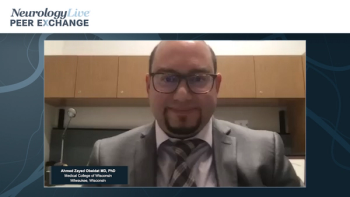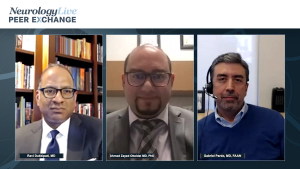Articles by Gabriel Pardo, MD, FAAN

Panelists discuss how in multiple sclerosis (MS) treatment, clinicians must strategically evaluate disease progression, considering within-class or mechanism-of-action switches. Comprehensive monitoring, personalized approaches, and proactive management are crucial for optimizing patient outcomes and minimizing long-term neurological disability.

Panelists discuss how clinicians can evaluate cognitive health using neuroimaging, cerebrospinal fluid (CSF)/blood biomarkers, and comprehensive assessments. Understanding concepts like cognitive progressive irreversible reductions in activity (PIRA) and focusing on multifaceted interventions—including lifestyle modifications, early detection, and personalized strategies—can help maintain cognitive wellness and mitigate decline.

Panelists discuss how the CLARIFY-MS extension study revealed stable cognitive function 4 years post cladribine, highlighting the potential of early treatment to preserve cognitive capabilities in multiple sclerosis (MS) patients. Cognitive assessments remain crucial for monitoring disease progression and tailoring patient management.

Panelists discuss how disease-modifying therapies (DMTs) like dimethyl fumarate, fingolimod, and cladribine demonstrate potential blood-brain barrier penetration, offering neuroprotective mechanisms. While these therapies show promise in mitigating cognitive decline, their impacts vary, highlighting the complex interplay among neuroinflammation, immune modulation, and cognitive preservation in multiple sclerosis management.

Panelists discuss how in managing multiple sclerosis (MS), clinicians must adopt a comprehensive approach to progressive irreversible reductions in activity (PIRA) that prioritizes early detection, transparent communication, and patient empowerment. By integrating regular cognitive assessments, providing compassionate and clear explanations, and emphasizing proactive management strategies, physicians can help patients navigate the complex cognitive landscape of MS, ultimately preserving quality of life and fostering patient resilience in the face of neurological challenges.

Panelists discuss how the MAGNIFY-MS study underscores the significance of early, aggressive multiple sclerosis (MS) treatment with cladribine, demonstrating its potential to effectively mitigate disability progression through progression independent of relapse activity (PIRA) suppression in both treatment-naive and previously treated patient populations, with outcomes competitive with other high-efficacy disease-modifying therapies.

Panelists discuss how recent investigations into progression independent of relapse activity (PIRA) in multiple sclerosis (MS) have revealed complex inflammatory signatures in cerebrospinal fluid and peripheral blood, with biomarkers like neurofilament light chain and pro-inflammatory cytokines showing promise in tracking neurodegeneration. The Swedish MS Registry’s findings suggest that early implementation of high-efficacy disease-modifying therapies may effectively delay or prevent PIRA progression, though these results require further robust, multicenter validation to definitively establish clinical significance and generalizability.

Panelists discuss how progression independent of relapse activity (PIRA) in multiple sclerosis (MS) represents continuous neurological decline unrelated to inflammatory events, distinct from relapse-associated worsening (RAW). Recent ECTRIMS 2024 presentations emphasized standardized evaluation methods to better understand disease progression and improve patient management strategies.

Panelists discuss how modern multiple sclerosis (MS) management has evolved from symptomatic treatment to a proactive, personalized approach leveraging advanced biomarkers and sophisticated disease-modifying therapies. The focus has shifted toward early intervention, precise monitoring, and comprehensive disease control, significantly improving patient outcomes and quality of life.

Ahmed Zayed Obeidat MD, PhD; Ravi Dukkipati, MD; and Gabriel Pardo, MD, FAAN, share key takeaways for clinicians treating RRMS.

Expert neurologists highlight upcoming agents for the treatment of RRMS, focusing on biomarkers.

Experts in neurology provide insight on challenges that arise with the use of generic DMTs in RRMS treatment, such as cost to the patient.

Ahmed Zayed Obeidat MD, PhD; Ravi Dukkipati, MD; and Gabriel Pardo, MD, FAAN, comment on the use of generic DMTs in the treatment of RRMS, highlighting efficacy and safety data as well as level of equivalence to brand name treatments.

Expert neurologists discuss treatment options for a patient with comorbid autoimmune diseases, relapsing/remitting multiple sclerosis, and psoriasis.

Ravi Dukkipati, MD, and Gabriel Pardo, MD, FAAN, review the use of rituximab and other disease-modifying therapies in a patient with an established diagnosis of relapsing/remitting multiple sclerosis.

Ahmed Zayed Obeidat MD, PhD; Ravi Dukkipati, MD; and Gabriel Pardo, MD, FAAN, discuss a patient case with relapsing/remitting multiple sclerosis progression and share considerations for switching treatment.

Expert neurologists review treatment options for a young female with relapsing remitting multiple sclerosis (RRMS).

Ahmed Zayed Obeidat MD, PhD; Ravi Dukkipati, MD; and Gabriel Pardo, MD, FAAN, consider reasons to use generic disease-modifying therapies (DMTs) as a first-line therapy in the treatment of relapsing remitting multiple sclerosis (RRMS).

Experts in neurology highlight factors that lead them to choose certain therapies to treat relapsing remitting multiple sclerosis (RRMS), such as high efficacy in clinical trials.

Gabriel Pardo, MD, FAAN, describes the process that generic RRMS medications have to go through to be approved by the FDA, highlighting the abbreviated new drug application [ANDA] process.

Expert neurologists review availability of generic disease-modifying therapies [DMTs] and the effectiveness of reduced cost to the patient with RRMS

Ravi Dukkipati, MD, and Gabriel Pardo, MD, FAAN, discuss barriers in accessing treatment for patients with RRMS, as well as a lack of appropriate biomarkers to monitor disease progression.

Experts in neurology review recent advances in the treatment landscape of relapse-remitting multiple sclerosis (RRMS) and the ever-present challenge of tailoring treatment to individual patients.








